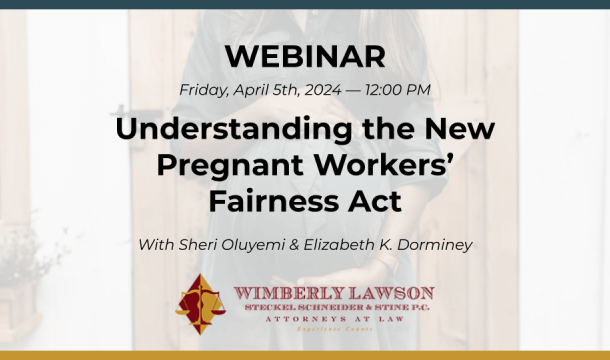Breaking Up is Hard to Do: Part II – Unemployment Compensation Hearings.
As Kathleen Jennings observed in her blog post Breaking Up is Hard to Do: Handling Employee Terminations (https://wimlaw.wordpress.com/2016/04/28/breaking-up-is-hard-to-do-handling-employee-terminations-with-dignity/), few decisions are as difficult as firing an employee. Regardless of the reason, terminating an employee is difficult for both parties, and in this day, can lay the ground-work for a charge of discrimination or a lawsuit. A terminated employee, especially an angry one, has little reason not to discuss the situation with a plaintiff's employment litigation attorney, and a good one will carefully shift through every facet of the unhappy ex-employee's history with your Company. One of the very first things they will do is review the ex-employee's Separation Notice, and encourage them to file for unemployment compensation.
Most states provide short-term unemployment compensation for all eligible workers except those who are fired for "cause." Standards vary widely from state to state, and one must carefully review the standards for an award of unemployment compensation. If the employer does not contest the claim, unemployment compensation usually is granted so long as the worker otherwise qualifies. If the employer disputes the claim, an informal administrative adjudication process begins. This can be a wonderful opportunity for a seasoned plaintiff's attorney to gain some free discovery. It can also give the employer's counsel an opportunity to nail down the employee's story under oath.
While the decision, or award, in an unemployment compensation case may be inadmissible, or of only limited relevance, the hearing record can be a gold-mine. Frequently, companies don't really think much about unemployment compensation hearings, don't prepare for them, and fail to send someone with sufficient experience to represent the employer. The result can be a wonderful fishing expedition for the disgruntled employee's attorney into the facts and circumstances surrounding not only the employee's termination but their entire employment history with your Company. For example, the attorney may inquire as to whether the employee was properly paid under the Fair Labor Standards Act (FLSA), possibly discovering a claim for unpaid overtime or misclassification. Some workers' advocacy groups claim that more than 90% of employers violate the FLSA in some form or fashion. While that number probably is exaggerated, an overall imperfect-compliance rate of 50% would not be surprising. An unprepared and unwitting human resources representative could inadvertently lay the foundation for a successful wage-hour claim (even a class or collective action) while testifying at the unemployment compensation hearing.
Conversely, a good company representative or attorney can use the unemployment compensation hearing to dissuade the worker, or his or her attorney, from pursuing the case further. The Company's attorney can take the opportunity to show that the ex-employee was indeed fired for a legitimate, non-discriminatory reason. That attorney can show that the Company keeps accurate, contemporaneous records, that Company has and enforces its Employee Handbook, and that the employee in question was counseled on numerous occasions about his poor performance or behavior issues. Also, the attorney could possibly gain admissions from the ex-employee, which will make successful future litigation highly unlikely. The goal will be to convince the ex-employee, and his or her attorney, that while the situation was unfortunate, the Company did nothing illegal and will aggressively defend itself from even a frivolous claim or lawsuit.
Take home point: Don't treat unemployment compensation hearings as if they don't matter. A good plaintiff's attorney will use the hearing process to explore the facts and circumstances surrounding the ex-employee's employment history as well as the termination and start building a case against the company. Take a word of advice from the Scouts -- and Be Prepared!
Related Content
Get Email Updates
Recent Content

NLRB to Seek Rescission of past Discipline Imposed under Overbroad Employer Work Rules

Do Drive Cam Cameras inside Trucks Violate Employee Rights?

Amazon Considers Risk When Investigating Employee Misconduct

Latest NLRB Attack Goes beyond Non-Compete Agreements to Reach Outside Employment

NLRB Board Addresses BLM Insignia at Work




